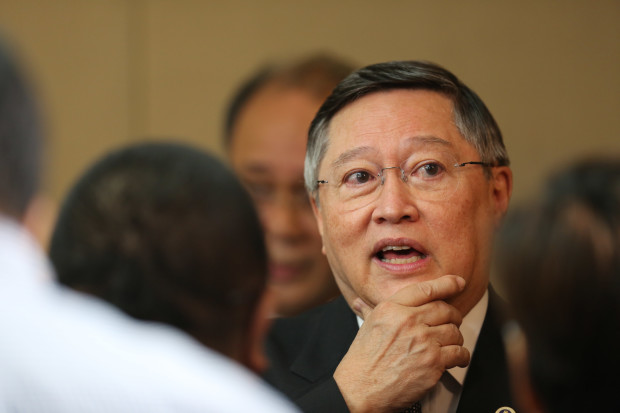 JAPANESE Prime Minister Shinzo Abe has embarked on a high-profile business trip to Southeast Asian countries and Australia to strengthen trade, security, and other regional cooperation.
JAPANESE Prime Minister Shinzo Abe has embarked on a high-profile business trip to Southeast Asian countries and Australia to strengthen trade, security, and other regional cooperation.
But while he held talks with Australian Prime Minister Malcolm Turnbull in Sydney, ocean activists say there is something amiss in the meeting as whale hunting in the Southern Ocean was not included in the agenda.
Whaling in the Antarctic has strained diplomatic ties between Australia and Japan. The International Court of Justice ruled in 2014 that Japan’s whaling program is unlawful and therefore it must cease once and for all. The Federal Court of Australia also told Japan to stop its massive whaling in the region.
Despite the rulings, however, Japan ignored them and practically turned deaf ears to global condemnation.
For one thing, whaling is uniquely Japanese, a tradition that dates back since time immemorial – a cultural tradition that only Japanese can understand.
Chris Burgess wrote in The Asia-Pacific Journal an analogy comparing between Japan and whales.
He said to deny Japan from whaling is tantamount to denying Japan’s existence, an insult to its national pride and identity.
Speaking of Japanese-ness, whaling is not an isolated case that Japan has blatantly misunderstood.
Take for instance the demand for apologies for its wartime past. Japan withheld apologies and if it did, the form and content are rather ambiguous.
Japanese prime ministers have acknowledged the pains and sorrows wars have inflicted to hundreds or thousands of victims, but the nation’s officials continue to visit the Yasukuni Shrine to pay respect to war criminals.
SEE ALSO: Japan, S. Korea ‘comfort women’ feud flares amid Pyongyang missile fears
The comfort women’s issue is another thing.
Survivors have demanded apologies and compensation, but Japan strongly denied forcing women into sex slavery — besides hasn’t Germany or America done it too?
Japan has been condemned by its Asian neighbours for glossing over wartime crimes yet it continues to rewrite schools history textbooks extolling its military past. Japan claims innocence to fingers pointed at him as if Japan is simply maligned with impunity.
Simply put, Japan and whales are inseparable. Whale is a delicacy bringing back nostalgia of home and childhood, as Rupert Wingfield-Hayes wrote in BBC News, Tokyo.
To the Japanese, ethics and morality on meat-eating are practically relative and arbitrary the same way Australians slaughter kangaroo for its meat or how British cook adorable rabbits for a hearty meal, or how Americans make a burger out of a holy cow.
For the Japanese, meat means whale. Could there be a deep chasm between eastern and western thought in regard to being a carnivore?
What Japan might have overlooked is the scale and magnitude of its whale hunting. Japan hunts for 333 mink whales each year traversing and trespassing international waters and marine sanctuaries.
SEE ALSO: Obama urged to pressure Japan to end whaling
Following the release of the Academy Award-winning documentary, The Cove (2009) , which showed the brutal whale slaughter turning waters into blood red, Taiji has become ground zero for local and international activism. Taiji is a town located in Higashimuro District, Wakayama Prefecture.
The film brought global awareness on how fishermen round up some 1,000 dolphins a year to sell to marine parks or kill for meat.
In response to it, Megumi Sasaki produced a documentary film, A Whale of a Tale , in an attempt to shed light on the juxtaposition of contrast between Japanese and non-Japanese thoughts in regard to whale.
Her film, however, did not get as much attention as The Cove.
Japan did not sail to international waters to hunt for whales, not until 1934 , eventually ending up to Antarctica. The nation’s confidence was boosted with its advancing technology including the introduction of steam ships and grenade-tipped harpoon guns. Further, whales helped keep Japanese citizens fed both during and after World War II.
Just like its display of military might in the heydays of territorial expansion, the Japanese whaling fleet commands strength and fearless dominion over international waters.
Confrontation at Sea
The Sea Shepherd has been in the media spotlight, unfazed with the Japanese fleet.
The marine conservation group has launched an annual campaign to confront and send the Japanese fleet back home minus the whales.
Dramatic confrontations like adrenaline-packed action movie have taken place in high seas. The head-on clashes, however, have been said to be illegal posing risk and danger at sea.
The Sea Shepherd has been charged in a U. S. court for its action despite its noble cause. The U. S. arm of anti-whaling group Sea Shepherd has agreed to pay AU$3.332 million (US$2.25 million) to Japanese whalers for breaching a court injunction.
But just like the Japanese, who can stop the Sea Shepherd?
This year, the group dispatched two vessels to mutually bully and harass the Japanese fleet. Sea Shepherd Global vessels, the Ocean Warrior and the MV Steve Irwin, left Australia’s Southern Operations Base the first weekend of December carrying 51 crew members from eight countries.
Their goal is to intercept the Japanese fleet, which departed from Japan in late November, and prevent them from killing their self-allocated quota of 333 minke whales. This year’s campaign is dubbed as Operation Nemesis.
What else can be done?
Matt Collis of the International Fund for Animal Welfare suggested it is critical to maintain diplomatic pressure on Japan.
He said external pressure can only be successful if enough decision-makers in Japan understand the risks to Japan’s wider interests by continued whaling and start to question the wisdom of that decision.
He also noted that the main option for governments is to make strong diplomatic protests to Japan as 33 countries have already done so, including Australia, the U. S., Mexico, South Africa and all 28 EU member states, led by New Zealand.
The Japanese government needs to understand the changes that have taken place in the course of human history. This is the era where global awareness on the state of the planet has become more urgent than ever.
Part of the difficulty to stop Japanese whaling is rooted in its bureaucratic system. Japan’s whaling is government-run, a large bureaucracy with research budgets, annual plans, promotions and pensions.
If the ministry’s office in charge of whaling is downsized, it discredits the bureaucrats and politicians. For now, downsizing or demolishing the whaling section is not possible. As BBC noted:
More activism
Activism has to continue to put pressure on Japan sending a message that time has changed.
Remember what the small neighbour South Korea did. Victims of comfort women protested every Wednesday without ceasing since the 2005 in front of the Japanese Embassy in Seoul.
The move was aimed at forcing the Japanese government to make public and face-to-face apology, as well as to offer individual compensation for its wartime sex crimes.
As a constant reminder, the now aged women in their 80s or 90s, supported by various civic and academic groups, put up bronze statues in front of the Japanese Embassy in Seoul and in major cities worldwide.
The statues depict young girls who were forced to served as comfort women for Japanese soldiers during World War II. The sight has embarrassed embassy officials. Recently, these grandmothers have stroke a breakthrough.
SEE ALSO: Japan: South Korea’s WWII ‘comfort women’ to receive $90k each
The Japanese government finally caved in to their demands for formal apology and compensation. However, there is a string-attached to the compensation package. Japan asked the South Korean government to remove the statues they have erected in front of the embassies and elsewhere.
A big whale statue might not be needed to put up in front of every Japanese embassy around the globe, but a sustained pressure can send the message across: it is sad to say goodbye to whaling, but time has changed.
It is time to free the whales.
Follow @DGreenJournal on Twitter
** This is the personal opinion of the writer and does not reflect the views of Asian Correspondent
© Source: https://asiancorrespondent.com/2017/01/can-japan-ignore-global-condemnation-whale-hunting/
All rights are reserved and belongs to a source media.
 „Der Papst unterstützt Donald Trump“, diese und andere Falschmeldungen auf der Onlineplattform Facebook sollen dem Kandidaten der Republikaner massiv zum Sieg der US-Präsidentschaftswahlen verholfen haben.
„Der Papst unterstützt Donald Trump“, diese und andere Falschmeldungen auf der Onlineplattform Facebook sollen dem Kandidaten der Republikaner massiv zum Sieg der US-Präsidentschaftswahlen verholfen haben. 

 Die deutsche Handballnationalmannschaft hat auch ihr zweites Gruppenspiel bei der Weltmeisterschaft in Frankreich gewonnen. Mit 35:14 (17:11) setzte sich Deutschland in Rouen souverän gegen den Außenseiter Chile durch. Damit macht das Team von Trainer Dagur Sigurðsson einen weiteren Schritt Richtung Achtelfinale. Bereits das erste Gruppenspiel hatte Deutschland gegen Ungarn gewonnen.
Die deutsche Handballnationalmannschaft hat auch ihr zweites Gruppenspiel bei der Weltmeisterschaft in Frankreich gewonnen. Mit 35:14 (17:11) setzte sich Deutschland in Rouen souverän gegen den Außenseiter Chile durch. Damit macht das Team von Trainer Dagur Sigurðsson einen weiteren Schritt Richtung Achtelfinale. Bereits das erste Gruppenspiel hatte Deutschland gegen Ungarn gewonnen. 
 Berlin/Frankfurt (dpa) — Aus tiefer Enttäuschung über die Flüchtlingspolitik von Kanzlerin Angela Merkel tritt die Bundestagsabgeordnete Erika Steinbach nach vier Jahrzehnten aus der CDU aus.
Berlin/Frankfurt (dpa) — Aus tiefer Enttäuschung über die Flüchtlingspolitik von Kanzlerin Angela Merkel tritt die Bundestagsabgeordnete Erika Steinbach nach vier Jahrzehnten aus der CDU aus. 
 JAPANESE Prime Minister Shinzo Abe has embarked on a high-profile business trip to Southeast Asian countries and Australia to strengthen trade, security, and other regional cooperation.
JAPANESE Prime Minister Shinzo Abe has embarked on a high-profile business trip to Southeast Asian countries and Australia to strengthen trade, security, and other regional cooperation. 
 The first prototype of a new eight-wheeled armored personnel carrier (APC) for use by the Japan Ground Self-Defense Force (JGSDF) has been developed to help defeat an invasion of any in a string of Japanese held islands in the East China Sea coveted by China.
The first prototype of a new eight-wheeled armored personnel carrier (APC) for use by the Japan Ground Self-Defense Force (JGSDF) has been developed to help defeat an invasion of any in a string of Japanese held islands in the East China Sea coveted by China. 
 TOKYO —
TOKYO — 
 Despite aid from the United States being put on hold, the Duterte administration has attracted close to P1 trillion in official development assistance (ODA) from economic giants China and Japan in its first seven months in office.
Despite aid from the United States being put on hold, the Duterte administration has attracted close to P1 trillion in official development assistance (ODA) from economic giants China and Japan in its first seven months in office. 
 ATAMI, SHIZUOKA PREF. – Japanese Communist Party Chairman Kazuo Shii emphasized Sunday that ongoing efforts to form a united front with other opposition parties will not be rolled back in the run-up to the next House of Representatives election.
ATAMI, SHIZUOKA PREF. – Japanese Communist Party Chairman Kazuo Shii emphasized Sunday that ongoing efforts to form a united front with other opposition parties will not be rolled back in the run-up to the next House of Representatives election. 
 FOXBOROUGH, Massachusetts —
FOXBOROUGH, Massachusetts — 
 TOKYO: Every day is the same. He wakes at 6:45 am, eats breakfast 20 minutes later and reports for work at eight o’clock sharp. But this isn’t your typical Japanese salaryman.
TOKYO: Every day is the same. He wakes at 6:45 am, eats breakfast 20 minutes later and reports for work at eight o’clock sharp. But this isn’t your typical Japanese salaryman.

